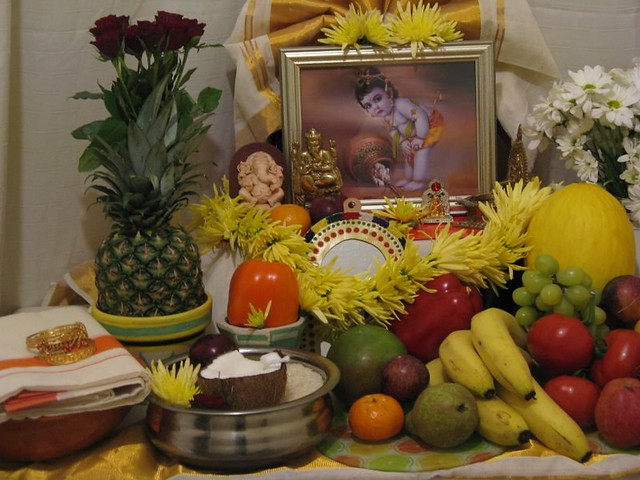HOW DID I CELEBRATE MY VISHU?
Vishu is an important cultural festivity in Kerala, the southern
state that stands for coconut trees and the Indian version of “melting pot”.
Yes, indeed, if you are looking for the right kind of cultural amalgam in
India, we are the right sort of people to dig into. Eat us with some salad, and
you can certainly learn a lot more about how much flexible the otherwise rigid and
edgy customs and traditions that mark Indian tradition could get. In Kerala,
you can get KFC to Shavarma, from beef to pork. All sorts of religions can be
found here, and all sorts of customs, including “everything”.
 |
| Image Courtesy: www.narayanalayam.org |
Although the whole society takes several different routes to
reach the summit of excitement during Vishu, I often stick to my own personal
karma during the days of festivities. Although Vishu is celebrated only on a
single day, the celebrations begin from a week before. Usually Vishu comes in
April and that puts the festivity right in the start of the summer holidays. Perhaps,
this is the factor that prompts me to pursue my karma of being a lazy butt unflinchingly.
I would like you to take a look at what I had written in April 2014 on Vishu in
The Indian Commentator. That was Vishu special post, by the way. I will paste
it below for you convenience.
You can decide why I would like to spend my holidays the way I do.
Do you really think I am lazy? There is more that you may learn about Vishu, Baisakhi,
and Rongali Bihu—celebrations that come forth at the same time of the year.
Baisakhi, Rongali Bihu, and Vishu
You might not even know what these words mean. Baisakhi, Rongali
Bihu and Vishu. These are names given to New Year and thanksgiving festivals in
India. It’s both new-year and thanksgiving. Here is a culture that still,
through its deeply engraved symbolic rituals, shows gratitude to nature. It may
not be as grandeur as it sounds, though. The fireworks used just to make these
celebrations unforgettable, causes serious health hazards and environmental
impacts. No one seems to care about that anyway.
Here is a peaceful way that I suggest in order to make the
celebration unforgettable. Take books in your hands, read.
So what do you think after reading it? Yes, indeed, if you could
get a real good book, any firecracker wouldn’t hold a chance against the thrill
and joy it may provide the reader.
I wish you all a very happy Vishu, Baisakhi, and Rongali
Bihu!









Comments